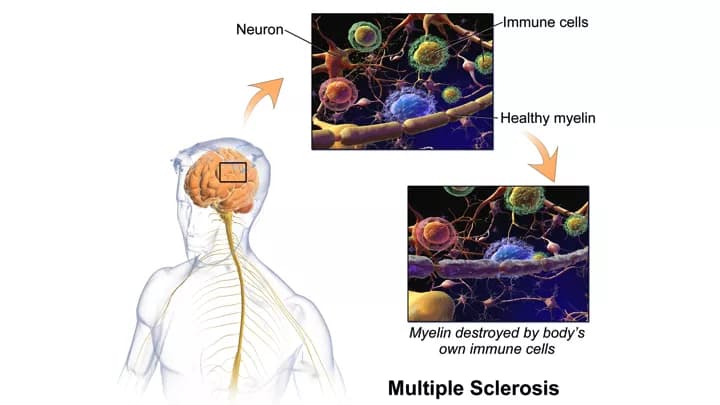
New Markers For Severe Form Of Multiple Sclerosis Uncovered
Scientists have uncovered two closely related cytokines -- molecules involved in cell communication and movement -- that may explain why some people develop progressive multiple sclerosis (MS), the most severe form of the disease. The findings, authored by researchers at Yale University, Oregon Health & Science University, and the University of California point the way toward developing a novel treatment to prevent progressive forms of the disease.
The research was published in the Proceedings of the National Academy of Sciences.
Researchers identified a cytokine, called macrophage migration inhibitory factor (MIF), along with its related protein, D-dopachrome tautomerase (D-DT), which are associated with progressive MS. These cytokines worsen the disease by increasing inflammation within the central nervous system. The researchers also linked enhanced expression of MIF with a gene variant that occurred more frequently in MS patients with progressive disease -- particularly in men.
These findings suggest that a simple genetic test could be used to identify MS patients at risk of developing the more severe form of the disease. As medications to halt the disease are under development, the researchers say that such a therapy could be used as part of a precision medicine approach that would be most effective in patients who have the MIF genetic susceptibility.
"The value of this discovery to patients is that there are now approved therapies, as well as new ones in development in the Oregon and Yale labs, which target the MIF pathway and could be directed toward progressive MS," said co-senior author Richard Bucala, M.D., professor of medicine, pathology, and epidemiology, and public health at Yale. Using a simple genetic test to select patients who might benefit the most from MIF blockers would accelerate drug development by reducing cost, decreasing risks of toxic effects, and providing a genetically tailored, effective treatment, he said.
"If you start a therapy before the disease has progressed very far, you have a much better opportunity to slow it or stop it," said co-senior author Arthur Vandenbark, a professor of neurology and molecular microbiology and immunology at the OHSU School of Medicine. "We now have a rational, molecular target for slowing or preventing the transition from relapsing-remitting to progressive MS, a stage of MS which is much more severe."
Scientists made the discovery through the careful clinical observation of patients with MS combined with immunologic and DNA analysis of their samples. In addition, researchers combined their human investigations with laboratory work showing that a therapeutic agent previously developed to successfully treat MS-like disease in rodents could block the pathologic action of both MIF and D-DT on its immune receptor -- the first time such a molecular intervention was achieved.
MS is a chronic condition that affects an estimated 2.3 million people worldwide. In MS, the sheath covering nerve fibers in the brain and spinal cord becomes damaged, slowing or blocking electrical signals from the brain reaching the eyes, muscles, and other parts of the body.
Materials provided by Yale University. Original written by Ziba Kashef. Note: Content may be edited for style and length.
Disclaimer: DoveMed is not responsible for the accuracy of the adapted version of news releases posted to DoveMed by contributing universities and institutions.
References:
Gil Benedek, Roberto Meza-Romero, Kelley Jordan, Ying Zhang, Ha Nguyen, Gail Kent, Jia Li, Edwin Siu, Jenny Frazer, Marta Piecychna, Xin Du, Antoine Sreih, Lin Leng, Jack Wiedrick, Stacy J. Caillier, Halina Offner, Jorge R. Oksenberg, Vijayshree Yadav, Dennis Bourdette, Richard Bucala, Arthur A. Vandenbark. (2017). MIF and D-DT are potential disease severity modifiers in male MS subjects. Proceedings of the National Academy of Sciences. DOI: 10.1073/pnas.1712288114
Related Articles
Test Your Knowledge
Asked by users
Related Centers
Related Specialties
Related Physicians
Related Procedures
Related Resources
Join DoveHubs
and connect with fellow professionals

0 Comments
Please log in to post a comment.